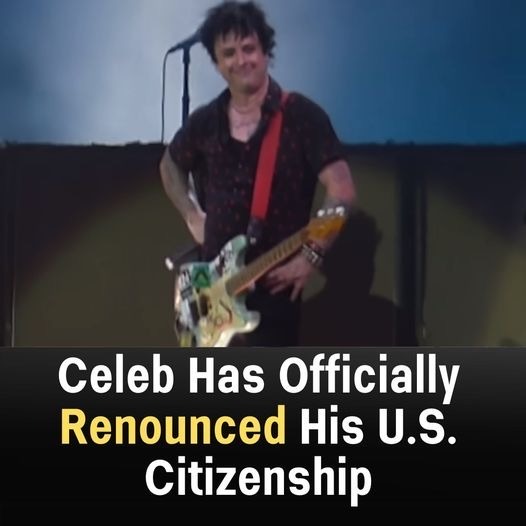During a packed and electrifying London concert, the lead singer of a world-renowned punk band left fans absolutely stunned when he made an unexpected and bold announcement from the stage. Known for his razor-sharp lyrics and confrontational stage presence, he told the audience that he plans to give up his U.S. citizenship entirely in protest of the Supreme Court’s recent and highly controversial decision to overturn Roe v. Wade, the landmark ruling that had protected abortion rights for nearly five decades. The crowd erupted into a mixture of gasps, cheers, and applause, with many fans whipping out their phones to capture the moment, knowing they were witnessing a historic and deeply personal declaration from one of music’s most outspoken figures.
He didn’t mince words. “I’m not kidding,” he said, his voice cutting through the roar of the audience, his eyes flashing with sincerity and defiance. “I cannot, in good conscience, remain a citizen of a country that has turned its back on women’s rights and bodily autonomy. I promise you, though, you’ll be seeing a lot more of me in Europe — and we’re going to make music, and we’re going to make statements that actually matter.” Fans, many waving banners and wearing band merchandise, cheered loudly, a mix of excitement and solidarity filling the venue. Some held signs that read “Rights Are Human Rights” and “Music Is Protest,” while others simply shouted their agreement, adding to the electric energy in the arena.
The very next night, the singer continued his pointed criticism during another sold-out show in the U.K., taking time between songs to express his deep frustration over the direction his home country has taken politically and culturally. He addressed the audience with fervor, detailing how he believed the Supreme Court’s ruling represented not just a legal change but a moral failure on the part of the nation he had grown up in. “It’s hard to recognize the place I once called home,” he said, pacing the stage with intensity, “when laws are used to strip away fundamental human rights from half of its population. I’ve devoted my life to speaking truth to power through music, and this, my friends, is the moment where we all have to take a stand.”
Elsewhere at Glastonbury, the renowned U.K. music festival known for its diverse lineup and influential performances, pop sensation Olivia Rodrigo also joined in the chorus of cultural critique. Taking the stage amid a sea of festival-goers waving flags and glowing wristbands, she openly called out the conservative justices responsible for the Supreme Court’s decision by name, delivering a passionate, unapologetic monologue that was met with deafening applause. “We cannot stay silent,” Rodrigo declared, her voice echoing across the fields. “We have to speak up for those who have been silenced, for the rights that have been taken from people we love, and for the future we want to see. This isn’t just politics — this is humanity.” Her performance quickly became one of the most talked-about moments of the festival, with social media erupting with clips of her speech, hashtags trending worldwide, and fans praising her courage and advocacy.
Between the punk singer’s London shows and Rodrigo’s Glastonbury speech, the combined impact was felt not only in the U.K. but across the globe. Fans and observers noted that music, long a platform for social commentary and activism, had once again become a central vehicle for expressing outrage, solidarity, and hope in response to a legal decision with far-reaching societal implications. For many, these performances were not just concerts but acts of protest, demonstrating that art and activism can intersect to create powerful, public statements.
Industry analysts noted that such reactions from high-profile artists could also influence international conversations on the subject, drawing attention to ongoing debates about reproductive rights, women’s autonomy, and the role of the judiciary in shaping public policy. Meanwhile, fans online debated the implications of a celebrity renouncing citizenship as a form of political protest, discussing whether it was symbolic, performative, or a genuinely profound step, and what it might mean for other public figures considering similar actions.
As the concerts continued, the energy was palpable, with thousands of attendees joining in chants, waving banners, and sharing messages of solidarity both in person and on social media. For many, it was a reminder that music has the unique power to unite people, amplify voices, and spark conversation in ways that traditional activism sometimes cannot. The historic Supreme Court ruling had ignited a wave of responses, and from punk rock stages to festival mainstages, artists were taking a stand, ensuring that the cultural dialogue would continue long after the last note was played.
